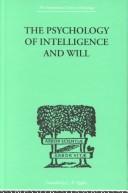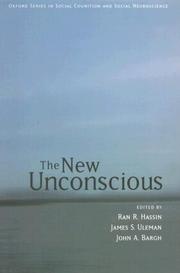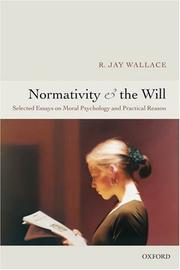| Listing 1 - 10 of 37 | << page >> |
Sort by
|
Book
ISBN: 9780511415050 0511415052 1107176506 1281751049 9786611751043 0511414374 0511412738 0511411839 0511413653 Year: 2008 Publisher: Cambridge Cambridge University Press
Abstract | Keywords | Export | Availability | Bookmark
 Loading...
Loading...Choose an application
- Reference Manager
- EndNote
- RefWorks (Direct export to RefWorks)
O'Shaughnessy investigates bodily action in a new edition of this classic work of analytical philosophy.
Will. --- Cetanā --- Conation --- Volition --- Ethics --- Philosophy --- Psychology --- Self
Book
ISBN: 0813220467 9780813220468 0813206227 9780813206226 Year: 1986 Publisher: Washington, D.C. Catholic University of America Press
Abstract | Keywords | Export | Availability | Bookmark
 Loading...
Loading...Choose an application
- Reference Manager
- EndNote
- RefWorks (Direct export to RefWorks)
Will --- Ethics, Medieval. --- Cetanā --- Conation --- Volition --- Ethics --- Philosophy --- Psychology --- Self --- Medieval ethics --- Early works to 1800.

ISBN: 0521596947 052159300X 1107114403 0511173792 0511017669 0511153031 0511302193 1139164198 1280429275 051105436X 0511039123 9780511039126 9780521593007 9780521596947 9780511017667 9781139164191 Year: 2001 Publisher: Cambridge New York Cambridge University Press
Abstract | Keywords | Export | Availability | Bookmark
 Loading...
Loading...Choose an application
- Reference Manager
- EndNote
- RefWorks (Direct export to RefWorks)
Ainslie argues that our responses to the threat of our own inconsistency determine the basic fabric of human culture. He suggests that individuals are more like populations of bargaining agents than like the hierarchical command structures envisaged by cognitive psychologists. The forces that create and constrain these populations help us understand so much that is puzzling in human action and interaction: from addictions and other self-defeating behaviors to the experience of willfulness, from pathological over-control and self-deception to subtler forms of behavior such as altruism, sadism, gambling, and the 'social construction' of belief. This book integrates approaches from experimental psychology, philosophy of mind, microeconomics, and decision science to present one of the most profound and expert accounts of human irrationality available. It will be of great interest to philosophers and an important resource for professionals and students in psychology, economics and political science.
Choice (Psychology). --- Self-defeating behavior. --- Will. --- Volonté --- Choix (psychologie) --- Choice (Psychology) --- Self-defeating behavior --- Self-Injurious Behavior --- Volition --- psychology --- Philosophical anthropology --- Affective and dynamic functions --- Volition. --- psychology. --- Volonté. --- Arts and Humanities --- Philosophy
Book
ISBN: 3957439736 9783957439734 1336026758 9781336026759 3897854147 9783897854147 Year: 2013 Publisher: Münster
Abstract | Keywords | Export | Availability | Bookmark
 Loading...
Loading...Choose an application
- Reference Manager
- EndNote
- RefWorks (Direct export to RefWorks)
Dass Willensschwäche ein Problem sein kann, weiß wohl jeder; aber warum und inwiefern ist Willensschwäche ein philosophisches Problem und was ist Willensschwäche eigentlich genau? Traditionellerweise ist Willensschwäche in der Moralphilosophie und in der Handlungstheorie diskutiert worden: Wie kann es sein, dass ich einem Moralurteil aufrichtig zustimme und doch nicht entsprechend handle, und wie kann es sein, dass ich nicht diejenige Handlungsalternative wähle, für die ich die besseren Gründe habe, sondern eine andere? Klassische Antworten auf diese Fragen stammen in der Antike von Platon und Aristoteles und in jüngerer Zeit von R. M. Hare und D. Davidson. Neben diesen vier klassischen Texten enthält der Band sechs weitere Texte aus den vergangenen 25 Jahren. Darin werden nicht nur alternative Erklärungen vorgeschlagen, sondern das Phänomen der Willensschwäche wird auch in einem größeren, über Fragen der Handlungstheorie und Moralphilosophie hinausgehenden Kontext erörtert und von anderen, verwandten Phänomenen abgegrenzt. Den Abschluss des Bandes bilden zwei Texte, in denen (nicht ganz ernst gemeinte, aber durchaus erhellende) Therapievorschläge gemacht werden
Will. --- PHILOSOPHY --- Willensschwäche. --- Philosophie. --- Mental philosophy --- Humanities --- Cetanā --- Conation --- Volition --- Ethics --- Philosophy --- Psychology --- Self --- Essays. --- Reference.

ISBN: 113633548X 1315010313 1136335412 9781136335419 0415210712 9780415210713 9780415211307 0415211301 9780415191326 0415191327 9781315010311 9781136335488 9781136335556 9781138875456 Year: 1999 Publisher: London Routledge
Abstract | Keywords | Export | Availability | Bookmark
 Loading...
Loading...Choose an application
- Reference Manager
- EndNote
- RefWorks (Direct export to RefWorks)
First Published in 1999. Routledge is an imprint of Taylor & Francis, an informa company.
Intellect. --- Will. --- Cetanā --- Conation --- Volition --- Ethics --- Philosophy --- Psychology --- Self --- Human intelligence --- Intelligence --- Mind --- Ability --- Thought and thinking
Book
ISBN: 1108670032 1108588107 1108498388 9781108670036 9781108498388 9781108735773 Year: 2021 Publisher: Cambridge, United Kingdom Cambridge University Press
Abstract | Keywords | Export | Availability | Bookmark
 Loading...
Loading...Choose an application
- Reference Manager
- EndNote
- RefWorks (Direct export to RefWorks)
William of Ockham (d. 1347) was among the most influential and the most notorious thinkers of the late Middle Ages. In the twenty-seven questions translated in this volume, most never before published in English, he considers a host of theological and philosophical issues, including the nature of virtue and vice, the relationship between the intellect and the will, the scope of human freedom, the possibility of God's creating a better world, the role of love and hatred in practical reasoning, whether God could command someone to do wrong, and more. In answering these questions, Ockham critically engages with the ethical thought of such predecessors as Aristotle, Augustine, Thomas Aquinas, and John Duns Scotus. Students and scholars of both philosophy and historical theology will appreciate the accessible translations and ample explanatory notes on the text.
Ethics --- Will --- God --- Virtue --- Philosophy, Medieval. --- Medieval philosophy --- Scholasticism --- Metaphysics --- Misotheism --- Theism --- Cetanā --- Conation --- Volition --- Philosophy --- Psychology --- Self --- Philosophy, Medieval
Book
ISBN: 9780521763301 9780511778995 9781107692077 9780511860522 0511860528 0511857918 9780511857911 0511778996 0521763304 0511861486 1107217059 1282921738 9786612921735 0511859651 0511858787 0511857047 1107692075 Year: 2010 Publisher: Cambridge New York Cambridge University Press
Abstract | Keywords | Export | Availability | Bookmark
 Loading...
Loading...Choose an application
- Reference Manager
- EndNote
- RefWorks (Direct export to RefWorks)
This book offers a way of approaching the place of the will in Descartes' mature epistemology and ethics. Departing from the widely accepted view, Noa Naaman-Zauderer suggests that Descartes regards the will, rather than the intellect, as the most significant mark of human rationality, both intellectual and practical. Through a close reading of Cartesian texts from the Meditations onward, she brings to light a deontological and non-consequentialist dimension of Descartes' later thinking, which credits the proper use of free will with a constitutive, evaluative role. She shows that the right use of free will, to which Descartes assigns obligatory force, constitutes for him an end in its own right rather than merely a means for attaining any other end, however valuable. Her important study has significant implications for the unity of Descartes' thinking, and for the issue of responsibility, inviting scholars to reassess Descartes' philosophical legacy.
Will --- Cetanā --- Conation --- Volition --- Ethics --- Philosophy --- Psychology --- Self --- Descartes, René, --- Descartes, Renatus --- Cartesius, Renatus --- Descartes, René --- Will. --- Arts and Humanities --- Descartes, Rene,

ISBN: 0195307690 9780195307696 9780195149951 0195149955 Year: 2005 Publisher: Oxford Oxford University Press
Abstract | Keywords | Export | Availability | Bookmark
 Loading...
Loading...Choose an application
- Reference Manager
- EndNote
- RefWorks (Direct export to RefWorks)
Subconsciousness --- Unconscious (Psychology) --- Volition. --- Subconsciousness. --- Inconscient --- sociale cognitie --- sociale cognitie. --- Unconsciousness --- Psychology --- Cognitive psychology --- Sociale psychologie --- Cognition. --- Emotions. --- Perception. --- Social Behavior. --- Unconscious, Psychology.

ISBN: 0191536997 1280756195 9786610756193 1429430818 9781429430814 9780199287499 019928749X 0199287481 9780191536991 1383043450 Year: 2006 Publisher: Oxford New York Clarendon Press Oxford University Press
Abstract | Keywords | Export | Availability | Bookmark
 Loading...
Loading...Choose an application
- Reference Manager
- EndNote
- RefWorks (Direct export to RefWorks)
This publication collects 14 papers on moral psychology and practical reason by R.J. Wallace, one of the leading philosophers currently working in these areas. They explore the interpenetration of normative and psychological issues in a series of debates that lie at the heart of moral philosophy.
Normativity (Ethics) --- Will. --- Practical reason. --- Practical rationality --- Practical reasoning --- Rationality, Practical --- Reasoning, Practical --- Reason --- Cetanā --- Conation --- Volition --- Ethics --- Philosophy --- Psychology --- Self --- Ethical norms --- Normativeness (Ethics)
Book
ISBN: 1280023716 0203711467 9780203711460 9781134410897 9781134410934 9781134410941 9780415305822 9780415303743 113441093X Year: 1963 Publisher: London, Routledge & K. Paul
Abstract | Keywords | Export | Availability | Bookmark
 Loading...
Loading...Choose an application
- Reference Manager
- EndNote
- RefWorks (Direct export to RefWorks)
Action, Emotion and Will was first published in 1963, when it was one of the first books to provoke serious interest in the emotions and philosophy of human action. Almost forty years on, Anthony Kenny's account of action and emotion is still essential reading for anyone interested in these topics.The first part of the book takes an historical look at the emotions in the work of Descartes, Locke and particularly Hume. In the second part, Kenny moves on to discuss some of the experimental work on the emotions by 20th Century psychologists like William James. Separate chapters cover
Act (Philosophy). --- Emotions (Philosophy). --- Emotions. --- Will. --- Emotions --- Will --- Psychology --- Social Sciences --- Ethics --- Philosophy --- Self --- Cetanā --- Conation --- Volition --- Affect (Psychology) --- Affective neuroscience --- Apathy --- Pathognomy --- Feelings --- Human emotions --- Passions
| Listing 1 - 10 of 37 | << page >> |
Sort by
|

 Search
Search Feedback
Feedback About UniCat
About UniCat  Help
Help News
News